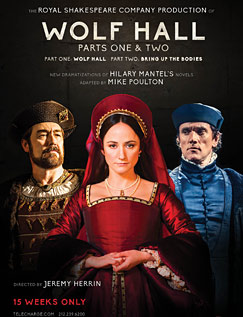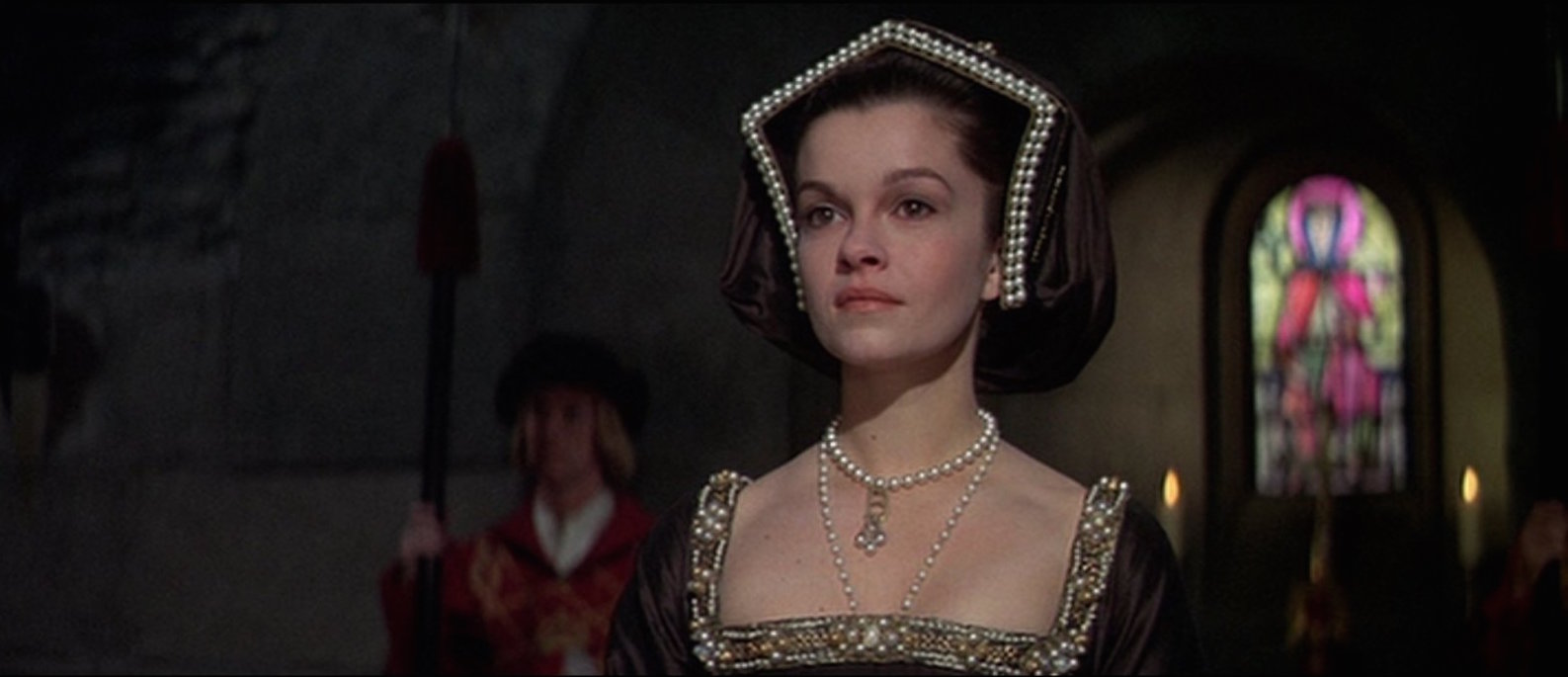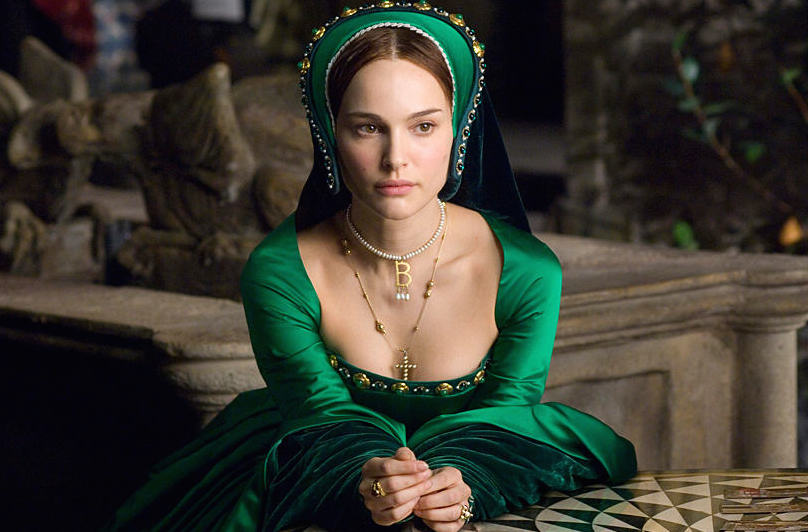 479 years ago on May 19th the second and most famous of Henry VIII's six wives, Anne Boleyn, was beheaded. But almost 5 centuries after her death, her life continues to fascinate storytellers. It seems that every couple of years there's a new interpretation of the events that conspired in England all those years ago. The latest version of King Henry and his many wives is Hilary Mantel's award-winning books Wolf Hall and Bring Up the Bodies. Both books have already been adapted to a miniseries that just aired on PBS over the past month and is currently playing on Broadway in a production that originally was staged by the Royal Shakespeare Company and played the West End (and recently received 8 Tony nominations including Best New Play). And while Mantel's books and the subsequent adaptations of her work focus on the events from Thomas Cromwell's point of view, there's no doubt that the reason we're still telling this tale is because of that woman that inspired a king to leave his wife and create an entirely new religion just to be with her: Anne Boleyn. (Even the Broadway production's marketing puts Lydia Leonard in her Tony-nominated performance as the one time queen front and center.)
479 years ago on May 19th the second and most famous of Henry VIII's six wives, Anne Boleyn, was beheaded. But almost 5 centuries after her death, her life continues to fascinate storytellers. It seems that every couple of years there's a new interpretation of the events that conspired in England all those years ago. The latest version of King Henry and his many wives is Hilary Mantel's award-winning books Wolf Hall and Bring Up the Bodies. Both books have already been adapted to a miniseries that just aired on PBS over the past month and is currently playing on Broadway in a production that originally was staged by the Royal Shakespeare Company and played the West End (and recently received 8 Tony nominations including Best New Play). And while Mantel's books and the subsequent adaptations of her work focus on the events from Thomas Cromwell's point of view, there's no doubt that the reason we're still telling this tale is because of that woman that inspired a king to leave his wife and create an entirely new religion just to be with her: Anne Boleyn. (Even the Broadway production's marketing puts Lydia Leonard in her Tony-nominated performance as the one time queen front and center.)
Inspired by the current influx of entertainment based on Boleyn and her exploits at court, for the anniversary of her infamous death, let's take a look at three famous actresses that have played Boleyn over the years...
The Private Lives of Henry VIII (1933)

Anne Boleyn played by Merle Oberon
Director Alexander Korda's take on Henry VIII was the first British film to receive an Academy Award nomination for Best Picture and Charles Laughton's Best Actor Oscar for his robust (okay, kinda grotesque) portrayal of the king was the first award every given to a non-Hollywood production. But the film, which tries to cover all 6 wives (well, except first wife Catherine of Aragon - a title card informs us she was "of no interest"...) all in the span of an hour and half. The film had originally been developed for stars Laughton and his wife (and future Bride of Frankenstein) Elsa Lanchester and would've focused solely on his fourth (and shortest marriage) to Anne of Cleves. So it comes as a bit of a surprise that the most interesting part of Henry's story, Anne Boleyn, is only covered within the first 15 minutes of the film and even more surprising that future Hollywood star Merle Oberon is barely in the film at all. We see Oberon's Boleyn only in the tower as she prepares for her execution. Anne Boleyn has gained a reputation over the years for being a power-hungry manipulator that skillfully, yet forcibly, worked her way to the top (in Wolf Hall the other characters continually mention that Anne always gets what she wants). But Oberon shows a softer, more gentle woman. She seems very deep in thought in her scenes and delivers her lines almost in a whisper. It's hard too see the usual, fiery Anne Boleyn in her work. But as she contemplates the fate that has befallen her, it's easy to see how her Anne was perhaps more of a pawn in the game instead of an active player.
It was the first major film role for Oberon, who would go on to receive a Best Actress nomination only two years later for 1935's The Dark Angel and is perhaps best known for her work as Cathy in Wuthering Heights (1939). It's said that her relationship and later marriage with director Korda was what helped advance her career to Hollywood stardom as he allowed her to be loaned out to the Hollywood studios. And even with her small amount of screentime, there's something magnetic about her presence when she appears. It's that certain something extra that makes you take notice and remember, a quality that defines a legend, whether she's a Hollywood actress like Merle Oberon or a queen of England.
Anne of the Thousand Days (1969)

Anne Boleyn played by Geneviève Bujold
In the '60s, it seemed that the Academy was obsessed with films about English history with movies like Becket (1964) and 1966's A Man for All Seasons (another film about Henry VIII's separation from the Catholic church, this time with Sir Thomas More at the center) winning Oscars and scoring multiple nominations. But although A Man for All Seasons won Best Picture and Becket received 12 (!) nominations, the years have not been as kind to the films and they now seem like dated Oscar-bait. And I suppose Anne of the Thousand Days, which was nominated for 10 awards including Best Picture, could be included alongside those relics. But despite it's epic runtime and stodgy, stage-bound direction, what saves it for me is Geneviève Bujold self-assured Oscar nominated (and Golden Globe-winning) performance as Anne.
Apparently when the film was pitched to Richard Burton (who plays Henry in the film) then wife Elizabeth Taylor told producer Hal B. Wallis that she had to play the part of Anne Boleyn. Luckily Burton talked her out of it (although she does make an uncredited cameo as a masked courtier that interrupts Irene Papas' Catherine of Aragon in prayer) because I can't imagine the film working without Bujold.
A relatively unknown stage actress from Montreal, Bujold had made a few French-language and Canadian films before starring as Anne, but her limited previous film work didn't prevent her from more than holding her own against Burton. With complete control and remarkable ease, Bujold commands the screen. Spitting out insults at Burton's Henry, their courtship has an intense dynamic as it's mostly made of him pursuing as she refuses his advances. Until she discovers by playing the game the allure of power and how yielding it effectively is the greatest talent she has.
The classically trained Bujold uses technique to show the strength in stillness as she uses her voice to command (and her accent with its tinge of French works perfectly with the character as the real Anne Boleyn spent her formative years in the French court). And her crowning achievement is her monologue in the tower after she's been found guilty of adultery, incest, and witchcraft as she counts the days she and Henry were together ("And of those thousand, one when we were both in love. Only one."). If only she had given birth to a male heir that lived, perhaps then Henry would not have sought to replace her. In a (historically inaccurate) final showdown with Henry, Bujold dares you to look away as she rages against Burton. It's said that an unexpected visit on set from Taylor (who heard rumors of her husband and Bujold) the day that scene was filmed was the fuel that gave Bujold her inner fire and fury. Wherever that poise and confidence came from, it was enough to rank Bujold as the only actress to receive an Oscar nomination for playing Anne Boleyn (and as one of my favorite portrayals of the ill-fated queen).
The Other Boleyn Girl (2008)

Anne Boleyn played by Natalie Portman
Like Wolf Hall this film was also based on a popular novel that looked at Henry and Anne's story from another character's perspective, this time Anne's older sister Mary who was originally Henry's mistress. But unlike Mantel's acclaimed novel and critically praised adaptations, the film version of Philippa Gregory's novel plays fast and loose with the actual history and ends up becoming more of a bodice-ripping soap opera (and a surprisingly boring one at that). Despite big-name actors like Portman and Scarlett Johansson as Mary, the February release date of the film was certainly a sign of how well the finished film turned out to be.
After reading the book, I was convinced that whoever played Anne in a film version would get an Oscar nomination for their performance - the role of Anne Boleyn is just too rich not to be an acting showcase. But sadly Portman is not up to the challenge (although she is certainly not helped by the inane dialogue and underdeveloped story). Her early flirtation with Eric Bana's Henry comes across as forced and limp. And when she is sent away to the French court as punishment for not properly wooing the king (a historical inaccuracy as Anne was an attendant in the French court long before she met Henry), she returns 3 months later as a seductive temptress that Henry can't resist. But the sudden transformation is unconvincing as Portman always feels like she's trying too hard to be the vixen and comes across as a child play acting the part. And anytime that Portman is asked to show authority or stand up against anyone, she acts like a spoiled brat not getting her way, throwing childish temper tantrums instead of commanding respect and sovereignty. Her Anne is not a woman that would make a man break laws of god and men to be with her. And the film does not ever seem to be on Anne's side at all. There is no mention of the other men she allegedly had affairs with (most scholars believe she was innocent of all the crimes brought against her), but in this version she is more than willing to sleep with her own brother to secure a male heir. But perhaps the film's greatest misstep is in making Anne Boleyn's motivation to rise in rank as simple sibling rivalry with Mary. It seems like a pretty petty reason for someone to have such lofty ambitions especially since Johansson's Mary is a simpering dolt with no drive (or personality) at all.
Looking at the film now it's more interesting to see the other actors (Benedict Cumberbatch, Best Actor winner Eddie Redmayne, Andrew Garfield - he's in the credits, although I have no idea where he was in the film, and Game of Thrones' Alfie Allen) before they became more well-known. As the actual stars of the film are never able to show why Anne Boleyn has remained a fixture in entertainment all these years later, her story a staple of historical drama. But that certainly hasn't stopped filmmakers from creating their own take on her tale as the legend and intrigue of Anne Boleyn seems to never fade...
Other Notable Annes: Vanessa Redgrave makes a silent cameo appearance as Boleyn in A Man for All Seasons. Before Natalie Dormer appeared on Game of Thrones, she was already versed in palace intrigue as Boleyn in Showtime's series The Tudors. And Helena Bonham Carter played her in a 2003 BBC/PBS production of Henry VIII.
Do you have a favorite performance or film about Anne Boleyn and why do you think her story has been told so many times? Let us know before you lose your head...